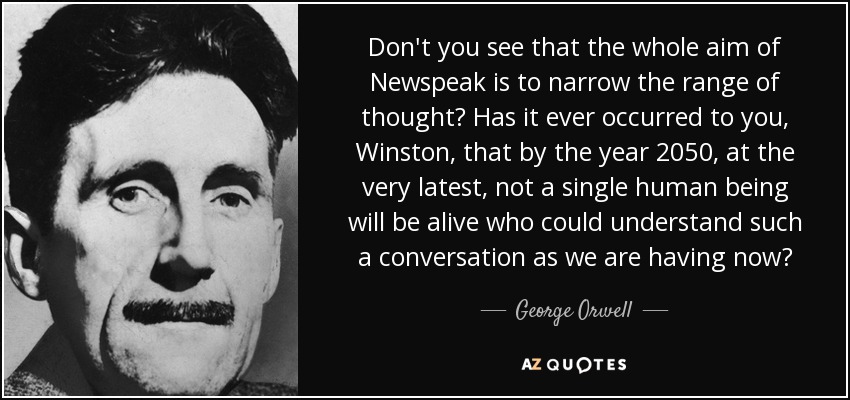 It’s very common to mention Orwell’s 1984 when criticising a tyrannical/repressive/linguistically manipulative government/corporation/individual. This is often followed by praise of Orwell and how wise and prophetic his 1984 was. I find these comparisons ridiculous about 90% of the time because they seem to fundamentally misunderstand what Orwell was saying and dilute it to a much weaker point.
It’s very common to mention Orwell’s 1984 when criticising a tyrannical/repressive/linguistically manipulative government/corporation/individual. This is often followed by praise of Orwell and how wise and prophetic his 1984 was. I find these comparisons ridiculous about 90% of the time because they seem to fundamentally misunderstand what Orwell was saying and dilute it to a much weaker point.
One example of such use is to criticise the military framing of civilian deaths as “collateral damage” and to call this phrase “Orwellian” and reminiscent of Newspeak. While I think it’s entirely appropriate to criticise use of phrases like “collateral damage”, the analysis is IMO incorrect. What’s wrong with the phrase is that it uses framing to direct the audience’s reaction. In this case to mislead them away from thinking that what actually happened was that the military killed civilians. While this is manipulation of language I don’t see how it would qualify as Orwellian. To find out what is Orwellian, let’s take a look at a famous quote from 1984.
“Don’t you see that the whole aim of Newspeak is to narrow the range of thought?”¦ Has it ever occurred to your, Winston, that by the year 2050, at the very latest, not a single human being will be alive who could understand such a conversation as we are having now?”¦The whole climate of thought will be different. In fact, there will be no thought, as we understand it now. Orthodoxy means not thinking-not needing to think. Orthodoxy is unconsciousness.”
The kind of dictatorship and language control Orwell was speaking about is of orders more magnitude than anything that’s happening now. I think it’s orders of magnitude more than what’s actually possible. It is so much stronger than any examples that people make when calling something Orwellian that it’s almost in an entirely different category.
The idea Orwell is buying into is the Sapir Whorf hypothesis, and the strong version too: that our cognition is literally trapped within the rigid categories of our language and that language sets up a total prison/boundary for our thinking. The Sapir Whorf hypothesis goes against the consensus of linguists. (Although a milder version has been brought back due to some recent results: eg. colour vocabulary affects colour perception.)
The idea of an Orwellian restriction of thought through the contraction of language is closely related to the idea that “language X has no word for Y”. Now, this trope that’s false close to 100% of the time because there’s nothing special about having a single word for something. Even if a language has no such word, it most certainly has a phrase for it. To see the silliness, here’s a list of ‘no word for X’ claims on LanguageLog, each with its own post rebutting it.
The idea of an Orwellian restriction of thought by the shrinking of vocabulary ignores the CENTRAL feature of language: the endless, recursive, infinite creativity and productivity both in meaning and syntax. It might even be associated with the old school behaviourist theories of language that consider it a result of simple stimilus-response and operant conditioning. If the specifics of your speech come from conditioning then it’s certainly possible to “condition” some concepts out of you. In this, Orwell might have been close to the best science of his time — but it’s not the best science of our time.
Let’s leave language for a minute and consider the broader concept of Orwellianism. One of the most powerful parts of 1984 is the ending, where Winston is effectively brainwashed into loving Big Brother. (Spoiler alert..!) I know someone who on reading that last bit as a teenager cried for days on end and it is a powerful image. But again, it relies on assumptions about human nature being much more of a blank slate than it is. In Orwell’s time it might have been taken for granted by some people that it’s possible to change people’s core beliefs (eg. make them love The Leader) through brainwashing. But like the Sapir-Whorf hypothesis, there seems to be no good evidence for it, at least in the strong form that Orwell speaks of. For more information, you can listen to (or read the transcript of) Skeptoid’s episode on brainwashing/deprogramming
The bottom line is that to take Orwell seriously we need to examine the world he’s actually painting, not a hopelessly-diluted version of it. Whether you’re talking about language or thought, 1984 pretty much requires human cognition to be much more of a blank slate, much more relative and a lot more malleable to crude restrictions (vocabulary control, brainwashing) than it actually is. Of course all of these things do influence the discourse, but this is too mild to call Orwellian. If we take him seriously, such a society is probably impossible. Even North Korea (possibly the most totalitarian state ever) is not Orwellian.
Interestingly, the criticisms of some (say) government being successfully Orwellian is a counterexample to the strong Orwellian hypothesis. The mere existence of the criticism shows that human thought has not been restricted by the manipulation. In other words if strong Orwellianism was possible and happened we wouldn’t know about it and would not be discussing whether or not it is happening.





0 Comments